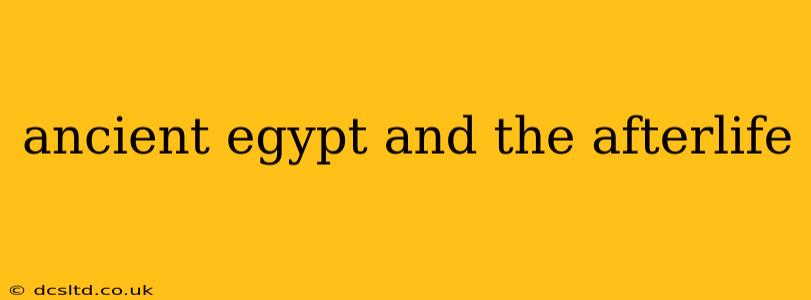Ancient Egypt's fascination with the afterlife is legendary, shaping their beliefs, customs, and even their monumental architecture. Far from a morbid preoccupation, their understanding of death was intricately woven into the fabric of daily life, a continuous journey rather than a final destination. This exploration delves into the complex beliefs and practices surrounding Ancient Egyptian views of the afterlife, revealing a civilization deeply invested in ensuring a successful transition to the next world.
What did Ancient Egyptians believe happened after death?
Ancient Egyptians didn't view death as an end but as a transformation. They believed the soul, or ka, continued to exist after death, requiring sustenance and a suitable dwelling place. This belief fueled elaborate burial rituals and the construction of magnificent tombs, filled with provisions for the afterlife. The journey wasn't straightforward, however. The deceased faced a series of challenges and judgments before reaching the Field of Reeds, a paradise mirroring earthly life. Success depended on living a righteous life and navigating the complexities of the afterlife's spiritual landscape.
How did Ancient Egyptians prepare for the afterlife?
Preparation for the afterlife began in life itself. Egyptians strived to live morally upright lives, adhering to Ma'at, the principle of truth, justice, and cosmic order. This commitment extended to rituals and practices aimed at ensuring a smooth transition. These included:
- Mummification: This intricate process aimed to preserve the body, providing a vessel for the ka to inhabit. The techniques evolved over time, becoming increasingly sophisticated.
- Funerary Texts: These texts, such as the Book of the Dead, provided spells, prayers, and instructions to guide the deceased through the underworld and ensure safe passage to the afterlife.
- Tomb Goods: Tombs were lavishly furnished with possessions, food, games, and other items deemed necessary for life in the afterlife. This included everything from jewelry and furniture to chariots and servants (represented by statues).
- Offerings: Regular offerings of food, drink, and other items were made to the deceased, even after burial. These were believed to nourish the ka and maintain their well-being in the afterlife.
What was the role of the gods in the Ancient Egyptian afterlife?
The Egyptian pantheon played a crucial role in the afterlife. Osiris, god of the underworld, judged the hearts of the deceased against the feather of Ma'at. Anubis, the jackal-headed god, weighed the heart. If found worthy, the deceased passed on to eternal bliss in the Field of Reeds. Other deities, such as Thoth (god of writing and wisdom) and Horus (god of the sky), also played vital parts in the judgment and subsequent journey. The gods' power and influence extended beyond death, shaping the individual's fate in the afterlife.
What is the Book of the Dead?
The Book of the Dead isn't a single book but a collection of spells and prayers intended to guide the deceased through the underworld. Each copy was personalized, tailored to the individual's needs and aspirations for the afterlife. These texts detail the rituals and prayers necessary for navigating the dangers and challenges of the journey, offering protection and assistance along the way. They provide invaluable insights into Ancient Egyptian beliefs about death, the underworld, and the process of achieving immortality.
What were the different levels of the Ancient Egyptian afterlife?
While the Field of Reeds represented the ultimate destination for the righteous, Ancient Egyptian beliefs didn't depict a single, uniform afterlife. The concept evolved over time, with different regions and periods having varying conceptions. Some beliefs included a journey through the underworld, featuring perilous obstacles and encounters with menacing deities, before reaching the peaceful paradise. The level of afterlife achieved depended greatly on the individual's conduct and piety during their earthly life.
Did Ancient Egyptians believe in reincarnation?
While not a central tenet of their beliefs, certain aspects of Ancient Egyptian religion hinted at concepts akin to reincarnation. The ka’s continued existence after death and the possibility of resurrection suggested a form of spiritual continuity. However, the focus remained primarily on achieving a successful transition to the afterlife and ensuring a comfortable existence in the Field of Reeds, rather than a cyclical rebirth.
This exploration into the complex and fascinating world of Ancient Egyptian beliefs about the afterlife reveals a civilization deeply concerned with death, not as an end, but as a transformation and a continuation of life in a different realm. Their meticulously planned rituals, breathtaking architecture, and profound spiritual beliefs provide a captivating glimpse into their worldview and enduring legacy.
